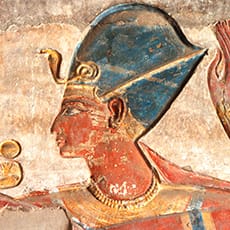AncestyDNA has completely screwed up their regions, so I would not put too much stock in where they claim you have ancestry. They put me down as Benin/Togo and Cameroon/Congo as well, but that does not tell you anything.
I took other tests and my paternal haplogroup E1b1a, indicated that I had the same paternity as Egyptians. On 23andme they posted this blurb:
You share an ancient paternal lineage with Pharaoh Ramesses III.
E-V38
Pharaoh Ramesses III defended Egypt in three consecutive wars during his approximately 30-year reign, but provoked dissent within his administration. Catalyzed by mounting internal strife, one of Ramesses’s lesser wives, Tiye, hatched a plot to have her son, Pentawer, usurp the throne by having Ramesses III murdered along with his appointed heir. A papyrus record of the resulting trial explains that the plot failed and that all involved were tried and convicted.
However, a modern CT scan of Ramesses III’s mummy revealed a deep slit in his throat, reopening a case long thought closed. The embalmers went to great lengths to cover up other wounds, including fashioning a fake toe out of resin where Ramesses’s real one had been hacked off, likely during a fatal attack. For thousands of years, Ramesses’s burial adornments concealed the wounds that mark one of the most famous royal dramas in history. Ramesses III's paternal lineage belongs to haplogroup E-V38, from which your line also stems. You and Ramesses III share an ancient paternal-line ancestor who probably lived in north Africa or western Asia.
*****************************************************************************************************************************
On National Geographic they posted this blurb:
King Tut
1341 BC to 1323 BC
Pharaoh Genius
PATERNAL MATCH
Not much is known about this Egyptian leader from the 14th century B.C. other than he was possibly as young as nine when he took power, and that he died by the age of eighteen. Tutankhamun (or King Tut) ruled Egypt during the height of the empire, during which time he rejected some of the radical religious beliefs held by his predecessors. Furthermore, Tut is thought to have been the son of siblings, physically weak, and also stricken with malaria. All of these conditions may have contributed to his early death.





 I shared an ancestor with Rameses too.
I shared an ancestor with Rameses too.






